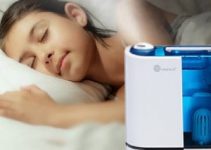Dry air in the home can irritate nasal passages and airways. For those suffering from allergies, it can exacerbate symptoms. For those with asthma, it’s capable of increasing the risk of an asthma attack.
Adding moisture to our home’s air through the use of a humidifier can help those with asthma and allergies to breathe better. It can help offer them relief. Even though humidifiers are beneficial, they may have some side effects for people with allergies.
For instance, increasing the humidity sometimes has a negative impact on those who are experiencing a runny nose or sinus congestion. Too much moisture in the air encourages the growth of dust mites, molds, and bacteria, which can create even more discomfort.

There are three important tips for asthma and allergy sufferers to consider whenever they are using a humidifier.
1. When and where should you use your humidifier?
Those with allergies may wake up with symptoms like nasal passage irritation or scratchy throats. It’s reasonable to install a humidifier in your bedroom and turn it on to run throughout the night. It is not recommended to use it in open spaces or basements during the day. For example, in the kitchen–where too much moisture is already–using a humidifier may add too much humidity to the air.
2. What features should your humidifier have?
The majority of humidifiers come with added features that add to their convenience and use. For those with allergies, here are some of the most important features:
Automatic humidistat
This feature helps the humidifier auto-regulate its work based on the level of humidity in the room.
Automatic shut-off settings
With this function, your humidifier can turn itself off when the desired humidity level is reached or when the water tank is empty.
Built-in HEPA air filters System
When the humidifier is running, it’s beneficial to filter the air before returning it to the room. If you already have an air purifier at home, then this built-in HEPA filter is not as important.
Humidifiers that are designed with the ability to remove molds and dust mites from the air are often the most beneficial to allergy sufferers.
3. What is the most suitable humidity level?
It is essential to keep a normal humidity level for sufferers of allergies. Excess humidity or low humidity can make allergy symptoms worse. The recommended humidity level should be within the range of 30 and 40 percent. This level of humidity is comfortable, healthy, and will help combat molds, mildew, dust mites, and more.


